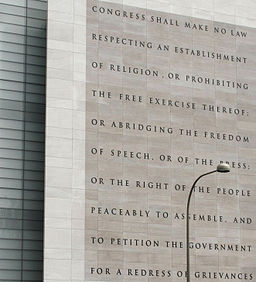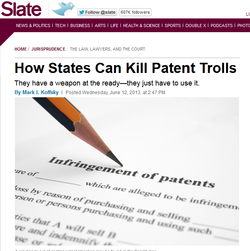
In an interesting turn of events, the future of the ongoing Washington Redskins trademark case could hinge on the outcome of an appeal made by an Asian-American dance rock band, after their request to register the mark “The Slants” was denied by the Patent and Trademark Office (PTO). The Trademark Trial and Appeal Board cancelled the registrations of a number of the football team’s trademarks last June. Although the music group’s founder, Simon Tam, has expressed his own opinion on how the two cases differ, the common denominator is a legal precedent set back in 1981, which applied § 2(a) of the Lanham Act as the basis for supporting the PTO’s power to deny a trademark that they deemed to be “immoral…or scandalous.” In the present two cases, the Lanham Act was interpreted to cover the reversal and refusal, respectively, of trademark registration for the sports team and band names that might be considered disparaging to an individual or group stereotypically associated with the terms in question.
Last week, the U.S. Court of Appeals for the Federal Circuit affirmed the PTO’s trademark denial of “The Slants,” agreeing that the band name could be perceived as offensive to Asian groups and individuals. In the very same ruling, however, Judge Moore included a section entitled “additional views” in which she explored the question of whether such a far-reaching legal power—banning registration of marks with potentially disparaging content—should be part of the PTO’s role, or if it perhaps violates the First Amendment. In the words of Judge Moore, “It is time for this Court to revisit McGinley’s holding on the constitutionality of § 2(a) of the Lanham Act. Under § 2(a), the PTO may refuse to register immoral, scandalous, or disparaging marks." In light of the fact that the usual three-person panel of the Federal Circuit would not have sufficient power to overturn the legal precedent, the Court has made the rare decision to sit as one and hear the case “en banc,” with all active Circuit judges participating.
Over the years, the Lanham Act has been used inconsistently and it is not objectively clear why some potentially offensive marks were disallowed, while other seemingly similar marks were registered successfully. The Slants’ frontman Tam hopes that this time the outcome will fall in their favor, thereby advancing his goal of re-appropriating stereotypical terms and empowering minority groups. Many people are following the case, as they see this as relevant to the ongoing Washington Redskins trademark case, and an important discussion about freedom of speech. The status quo in the Redskins case is based on the argument that the team name, logo, mascot, and identity are disparaging to Native American groups and individuals. If The Slants’ en banc case overturns the McGinley precedent, the Redskins’ pending appeal would likely be influenced as well, and they might have a better chance of reclaiming ownership of their federal trademark registrations.
Last week, the U.S. Court of Appeals for the Federal Circuit affirmed the PTO’s trademark denial of “The Slants,” agreeing that the band name could be perceived as offensive to Asian groups and individuals. In the very same ruling, however, Judge Moore included a section entitled “additional views” in which she explored the question of whether such a far-reaching legal power—banning registration of marks with potentially disparaging content—should be part of the PTO’s role, or if it perhaps violates the First Amendment. In the words of Judge Moore, “It is time for this Court to revisit McGinley’s holding on the constitutionality of § 2(a) of the Lanham Act. Under § 2(a), the PTO may refuse to register immoral, scandalous, or disparaging marks." In light of the fact that the usual three-person panel of the Federal Circuit would not have sufficient power to overturn the legal precedent, the Court has made the rare decision to sit as one and hear the case “en banc,” with all active Circuit judges participating.
Over the years, the Lanham Act has been used inconsistently and it is not objectively clear why some potentially offensive marks were disallowed, while other seemingly similar marks were registered successfully. The Slants’ frontman Tam hopes that this time the outcome will fall in their favor, thereby advancing his goal of re-appropriating stereotypical terms and empowering minority groups. Many people are following the case, as they see this as relevant to the ongoing Washington Redskins trademark case, and an important discussion about freedom of speech. The status quo in the Redskins case is based on the argument that the team name, logo, mascot, and identity are disparaging to Native American groups and individuals. If The Slants’ en banc case overturns the McGinley precedent, the Redskins’ pending appeal would likely be influenced as well, and they might have a better chance of reclaiming ownership of their federal trademark registrations.




